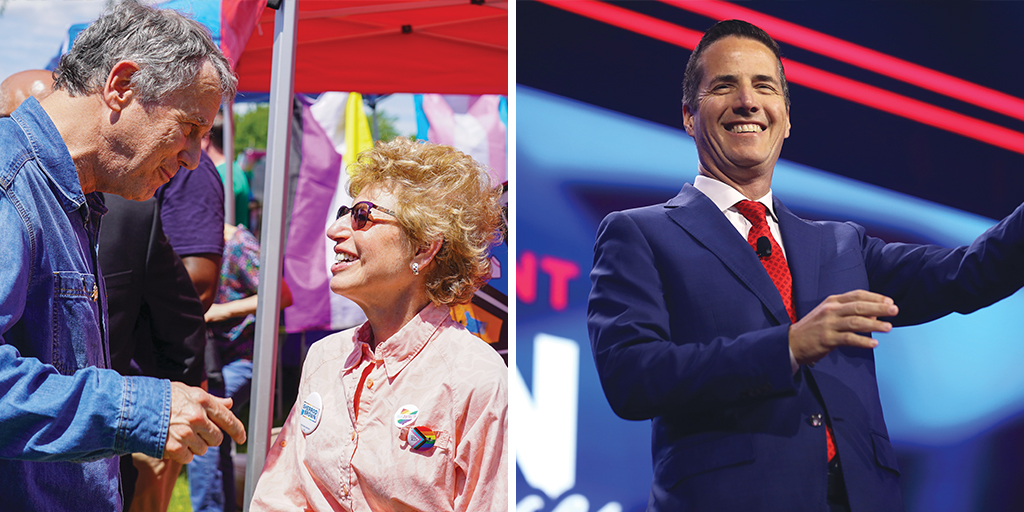
By Doug Oplinger
This will be the most unusual Senate candidate profile you’ve ever read.
The reason: This is about you and me, not them.
The proposal from Cleveland Magazine editors was for a profile of Sen. Sherrod Brown and his challenger, Bernie Moreno. I offered a unique approach. For more than 25 years, I’ve listened to thousands of Ohioans in community conversations say that they’re tired of political negativity, divisiveness and failure to address issues that are important to fixing what’s wrong with life here. They want someone they can trust to address complex and urgent problems rather than divide us.
And let’s state right up front: We have a right to be anxious. Ohio has been in a downward spiral for more than 20 years. Let’s skip past the grim household income and mental health data and go to the obituaries. We’re dying faster. Since 2000, our life expectancy has shortened while the rest of the nation, on average, is living longer.
So, this profile will cover what I’ve heard Ohioans say is important to improving their lives — not what politicians have chosen to make the campaign issues.
And, to address distrust of the news media, there will be transparency on my part. I’m using a recipe for campaign profiles that regular folks prescribed for Ohio news media in 2016. In a three-day meeting, people said they need data for perspective, a story that addresses the complexity of the issue, and candidates’ policies. Plus, they want to know how reporters do their work.
For this story, the topics explored come from community conversations, finalized this summer with an online brainstorming exercise sponsored by WKSU/Ideastream Public Media, the Akron Beacon Journal, Signal Akron and the nonprofit civic engagement group Fighting to Understand. Nearly 300 people participated.
Here are the topics on which most people of various persuasions agree can best improve life:
– We need leaders we can trust to address complicated issues for all of us and not divide us.
– We need to bridge divides — find peace in our homes and communities — to discuss tough issues without a fight.
– We need to address police-community relations.
– We need affordable, safe housing (this issue resonates in suburbs and major cities).
– We need job training that equips everyone for a rapidly changing work environment.
Brown and Moreno were asked in June for an in-person interview to discuss their thoughts on building trust. The other issues, they were told, would be explored in writing. I changed the rules on that, though, because Brown’s 50 years of public exposure provided an abundance of information. Moreno was given the opportunity to answer by email to fill in the blanks.
They also were told that they were prohibited from making negative statements about the opponent.
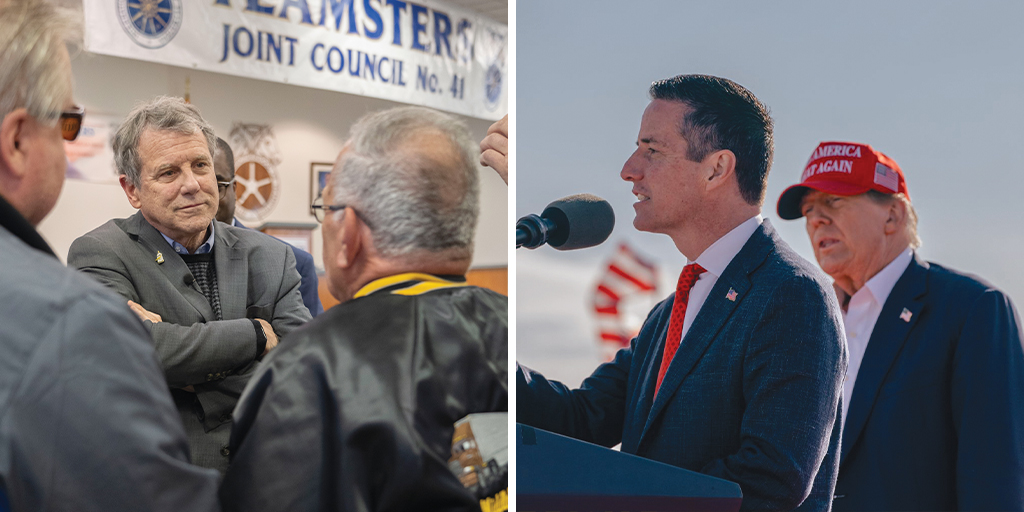
During the six weeks that I awaited the interviews, I binged on podcasts, news stories, original research and even listened to the archived funeral for Moreno’s mother. Along the way, I shared with others what I learned to gauge importance and to be mindful of my blind spots.
Childhood experiences defined two very different people.
At age 5, Bernie Moreno and his wealthy, politically connected family immigrated from Colombia in 1971. He matured in upscale South Florida in the era of President Ronald Reagan and graduated from what is often named Florida’s top private high school. He is Roman Catholic. His dad was a surgeon, and his mother was successful in South Florida real estate. He has been in the car sales business his entire working life, including a technology startup aimed at government titling of automobiles. He and his wife, Bridget, have a net worth between $18 million and $77 million, according to financial disclosure statements.
Sherrod Brown is an Eagle Scout who grew up in the tumultuous 1960s in the scrappy industrial community of Mansfield and graduated from public high school. He is Protestant. His dad was a family doctor and was on the local school board, and his mother was stay-at-home but heavily involved in social justice. He’s been involved in politics for 52 years. He and his wife, Connie Schultz, have a net worth of less than $660,000, according to disclosures.
I have much in common with both. I’m an Eagle Scout who grew up in the 1960s in the scrappy industrial community of Akron and graduated from a public high school. I’m Protestant. My dad was an electronics engineer and on the local school board and my mom, active in Girl Scouts and band boosters, was stay-at-home until I went to college. I’ve been an Ohio journalist for 53 years, mostly covering government, and my wife and I have a net worth about the same as Brown and Schultz.
But I also had a riding lawn mower before I could drive, ran a small yard work business and meanwhile cleaned toilets at the local police station and detailed the fire trucks next door. For 10 years, I was a business reporter and editor covering Northeast Ohio’s Fortune 500 CEOs and highly successful entrepreneurs.
So, like most Ohioans, I value the genius of industry that creates wealth and jobs, and also those who address equity. Communities thrive when both are successful.

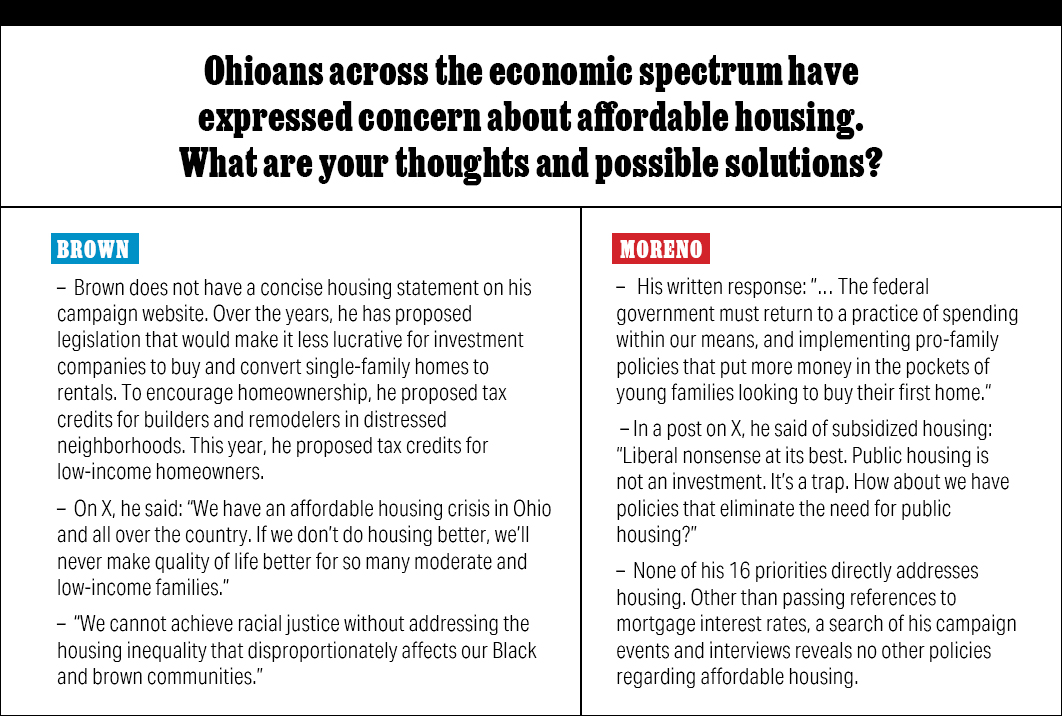
In comparing the two candidates’ positions on the issues, Moreno and Brown tend to fall squarely into the industry versus equity camps.
In a eulogy years ago for Moreno family matriarch Marta Moreno, a grandson clicked through the seven aunts and uncles and came to “Tio Bernie”: “They say about Bernie that he can’t sit still for more than two minutes without coming up with another great business idea.” The grandson described his grandmother as pushing the family toward courage, embracing competition and being riven and results-oriented.
Those mother’s admonitions can be seen in Moreno’s business success.
Brown also is driven. While at Yale University in 1972, he campaigned for George McGovern, an anti-war presidential candidate who lost in a landslide. When first drafted by a local party leader in 1974 to run for the Ohio House, the longtime Democratic House speaker retorted, “Where the hell did you get that goddamn hippie sonuvabitch?” He became Ohio’s youngest state representative. In 1982, at the age of 30, he won statewide office as Secretary of State. His only election loss was in 1990 against Bob Taft. He moved to Lorain in 1992, where he won election to the U.S. House, then moved to the Senate in 2006.
Exploration of his history shows consistent support for age, gender and racial equity in education, jobs, healthcare and veterans benefits.
As for those phone interviews to discuss the reasons people have lost trust in government and what they’ll do to earn trust, Brown and I talked for about 25 minutes in mid-July.
“When you do things that may look incremental, or small, they improve people’s lives and they build trust,” he said. In other words, it takes time.
He offered these examples:
Twenty years ago, Brown organized bus trips to Canada for seniors in his Lorain congressional district so they could purchase prescription drugs at half price. He sometimes accompanied them on the day-long trip. Later, he was instrumental in the passage of the Affordable Care Act.
For the last several years, Brown pushed for expanded health care for veterans exposed to Agent Orange in Vietnam and burn pits in Afghanistan and Iraq. The PACT Act of 2022 incorporated his ideas and expanded coverage to as many as 32,000 Ohioans.
A child tax credit he helped author was included in the 2021 pandemic-era American Rescue Plan, which he estimated was available to 92% of Ohio families. The credit expired and Congress has not renewed it.
When retirees came to him about severe reductions in their pensions, he secured legislation that provided a bailout of the Pension Benefit Guaranty
Corp., securing pensions for about 1.5 million
retirees.
Ohio has been among the worst for fentanyl overdose deaths. In negotiations with the police, he helped author the 2024 Fentanyl Act, expanding sanctions on Mexican and Chinese producers and, in 2018, joined then-President Donald Trump for the signing of the Interdict Act, which provided police with fentanyl detection tools and protection.
He didn’t mention his 1993 opposition to then-President Bill Clinton and Congressional leadership on the North Atlantic Free Trade Agreement, or NAFTA. He organized opposition, arguing it would hurt manufacturing workers. He failed. Twenty years later, NAFTA was scorned by what remained of Ohio’s unions and allowed Trump to make NAFTA a winning talking point.
A search of material attacking Brown over the decades shows that, except for an attempt to make his 1986 divorce an issue or that he has often described as “rumpled,” the most common criticism has been his adherence to the equity principles.
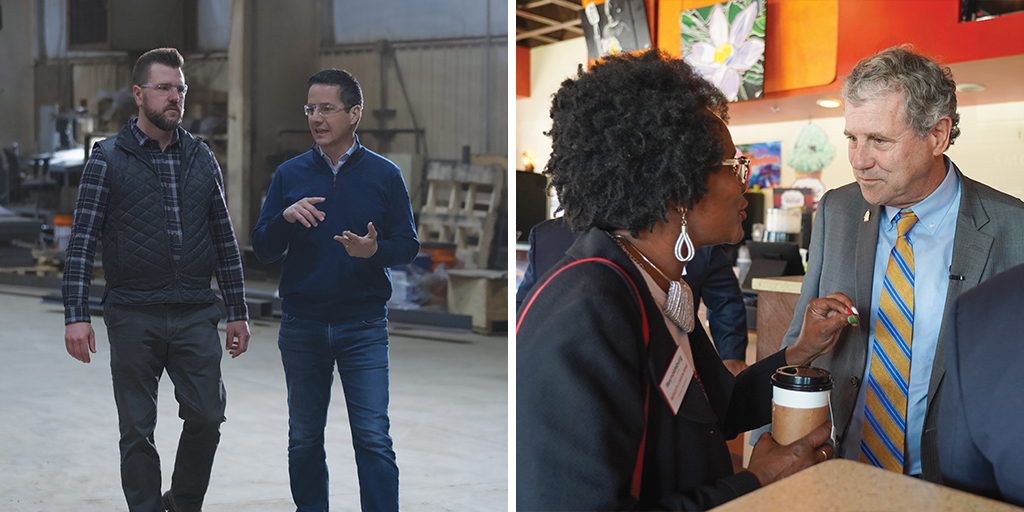
Moreno never granted an interview, even after a one-week extension. I requested notifications of where he would be so that I could travel to where he was — but never received notifications.
Instead, Moreno pulled a stunt. He traveled to Washington, appeared outside Brown’s Washington office where reporters were curiously waiting, and said: “I can tell you this. If I’m here, I will talk to [reporters] at any point in time, take tough questions. Sherrod Brown won’t do that.”
Put yourself in the journalist’s seat. What’s the next step? You still have readers who want to know if they can trust him. How do you do that fairly?
Here’s what may be helpful.
Cars have always been a keen interest for Moreno. At age 14, he wrote to General Motors Chairman Roger Smith with suggestions to improve sales. He chose the University of Michigan because of its proximity to the auto manufacturers. While studying business administration, Moreno interned at Automobile magazine, gaining the legendary title of “Super Gopher” because of his ability to anticipate the needs of people in the office. “No matter what we asked Bernie to do, he had already assigned it to himself and finished it,” an editor recalled. She explained that Moreno knew that test drivers daily had to climb several flights of stairs to retrieve their cars, get gas and get comfortable for a long drive. He moved the cars to the first floor before people arrived, had them gassed and detailed and set the radio stations to each driver’s favorite.
At 26, he was drafted from General Motors Saturn field operations by an East Coast dealership chain to manage a Boston store and over the next dozen years rose to vice president in charge of high-end cars. In 2005, at 38, he was approached by Mercedes-Benz — which wanted more minority owners — to buy a small outlet in North Olmsted. Before he started to downsize in 2016, he owned 15 dealerships in four states. He’s now down to two with an interest in a third, and his technology business is selling auto-related services to state bureaus of motor vehicles.
He donated $1 million to create the Bernie Moreno Center for Sales Excellence at Cleveland State University, with a mission to create a curriculum and training “in the science of persuasion, consumer behavior and market analysis.” He also donated nearly $2 million to create Bernie Moreno-
endowed scholarships at Cleveland State and Cuyahoga Community College.
But there are things he has said that are a little twitchy. He says he is a political outsider, but he gave $64,000 to Republican causes in the 2012 election cycle, and then became an outspoken advocate for Marco Rubio in the 2016 primary against Trump, giving more than $125,000 to GOP campaigns. He has been a donor ever since and appointed by the governor’s office to board positions.
Then, there’s the Trump issue. In an interview in 2016 while working for Rubio, Moreno said, “… there’s no scenario in which I would support Trump.” He expressed concern that Trump stoked “hatred” and that “fear” would “drive our
decision-making.”
Fast forward to March 2024, after securing Trump’s endorsement for Senate, he said in a Republican Primary debate: “Let me say something that needs to be said that hasn’t been said, President Trump is a good man. This idea that you support his policies but not the personality, that’s a bunch of BS and media talking points. We need more people to say that loudly and clearly.”
This after Trump had been adjudicated as a sex offender and found to have defrauded banks and the state of New York.
CNN obtained an explanation on the turnaround from a Moreno spokesman: He was “initially skeptical of President Trump, but he has never been so happy to be proven wrong about something.”
He pushed the racial insensitivity button in 2023. “You know, they talk about reparations,” for Black families suffering the legacy of enslavement. “White people died to free Black people” in the Civil War, Moreno said in a campaign event. “Where are the reparations for the people in the North who died to save the lives of Black people?”
Either he didn’t know or neglected facts. Civil War veterans and families received health care and death benefits. And, of the 360,000 Union casualties, 40,000 were Black. More importantly, well over 2 million enslaved people died an agonizing death due to brutal conditions.

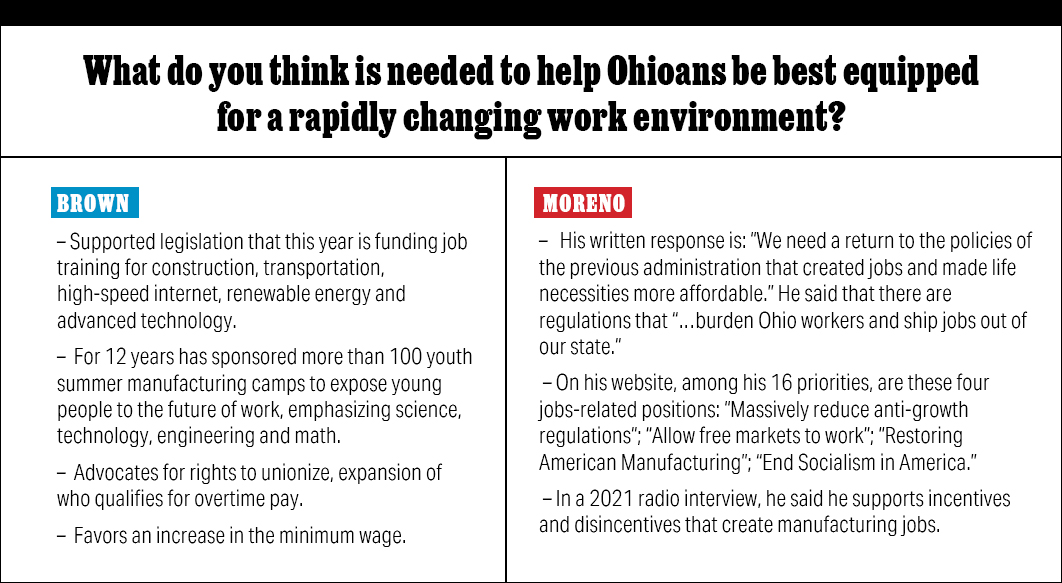
And let’s make space here for one more topic: Immigration. An editor said that because Moreno is making illegal immigration his primary issue, we need to give that some space. After all, Moreno did a “Defend America” bus tour for that purpose.
I hadn’t included immigration as an issue because, in community conversations, it never came up, and in the Akron media engagement exercise asking people to brainstorm on ideas that would improve life, of those 296 ideas, only four addressed immigration, and only two — 0.7% — reflected Moreno’s hardline approach.
So, here it is: Moreno has been unequivocal about life in Colombia as one of wealth, privilege and power, and that his mother wanted to emigrate here to create new wealth. He never says they fled Colombian socialism and violence, but instead were fearful of what socialism might bring. His position on immigration then, is that asylum seekers and illegal entrants who may not have had the privilege or foresight of his family are not excused from complying with the law.
In 2023-24, Brown favored legislation that would have funded increased border security and provided infrastructure to support those escaping humanitarian crises. Trump told Republicans to reject the bipartisan solution.
So, thoughts? Does this Senate profile help you think about which candidates can be trusted to address solutions favored by Ohioans? And did a journalist’s openness to life experiences and the reporting process affect believability?
I asked several people whether I should be so straightforward. Non-journalists said no, but journalists were intrigued as to how it would look.
I even asked Brown. He said no, don’t disclose my background because as a veteran, I know how to be fair.
I would have asked Moreno, too, but …
